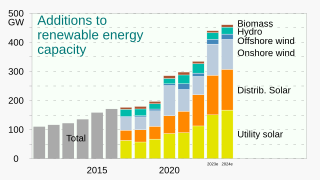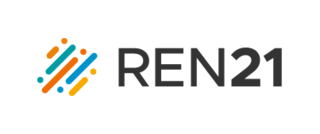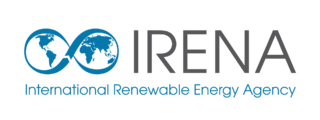
Renewable energy is energy that is collected from renewable resources that are naturally replenished on a human timescale. It includes sources such as sunlight, wind, the movement of water, and geothermal heat. Although most renewable energy sources are sustainable, some are not. For example, some biomass sources are considered unsustainable at current rates of exploitation. Renewable energy often provides energy for electricity generation to a grid, air and water heating/cooling, and stand-alone power systems. Renewable energy technology projects are typically large-scale, but they are also suited to rural and remote areas and developing countries, where energy is often crucial in human development. Renewable energy is often deployed together with further electrification, which has several benefits: electricity can move heat or objects efficiently, and is clean at the point of consumption. In addition, electrification with renewable energy is more efficient and therefore leads to significant reductions in primary energy requirements.

The International Energy Agency (IEA) is a Paris-based autonomous intergovernmental organisation, established in 1974, that provides policy recommendations, analysis and data on the entire global energy sector, with a recent focus on curbing carbon emissions and reaching global climate targets, including the Paris Agreement. The 31 member countries and 11 association countries of the IEA represent 75% of global energy demand.

Energy development is the field of activities focused on obtaining sources of energy from natural resources. These activities include production of renewable, nuclear, and fossil fuel derived sources of energy, and for the recovery and reuse of energy that would otherwise be wasted. Energy conservation and efficiency measures reduce the demand for energy development, and can have benefits to society with improvements to environmental issues.

Energy is sustainable if it "meets the needs of the present without compromising the ability of future generations to meet their own needs". Most definitions of sustainable energy include considerations of environmental aspects such as greenhouse gas emissions and social and economic aspects such as energy poverty. Renewable energy sources such as wind, hydroelectric power, solar, and geothermal energy are generally far more sustainable than fossil fuel sources. However, some renewable energy projects, such as the clearing of forests to produce biofuels, can cause severe environmental damage. The role of non-renewable energy sources in sustainable energy has been controversial. Nuclear power is a low-carbon source whose historic mortality rates are comparable to wind and solar, but its sustainability has been debated because of concerns about radioactive waste, nuclear proliferation, and accidents. Switching from coal to natural gas has environmental benefits, including a lower climate impact, but may lead to a delay in switching to more sustainable options. Carbon capture and storage can be built into power plants to remove their carbon dioxide emissions, but is expensive and has seldom been implemented.

REN21 is a think tank and a multistakeholder governance group which is focused on renewable energy policy.

The Renewable Energy and Energy Efficiency Partnership (REEEP) is a Vienna-based international organisation that advances markets for renewable energy and energy efficiency with a particular emphasis on the emerging markets and developing countries. Its primary focus is in de-risking and scaling up clean energy business models.

A low-carbon economy (LCE) or decarbonised economy is an economy based on energy sources that produce low levels of greenhouse gas (GHG) emissions. GHG emissions due to human activity are the dominant cause of observed climate change since the mid-20th century. Continued emission of greenhouse gases will cause long-lasting changes around the world, increasing the likelihood of severe, pervasive, and irreversible effects for people and ecosystems. Shifting to a low-carbon economy on a global scale could bring substantial benefits both for developed and developing countries. Many countries around the world are designing and implementing low-emission development strategies (LEDS). These strategies seek to achieve social, economic, and environmental development goals while reducing long-term greenhouse gas emissions and increasing resilience to the effects of climate change.

Renewable energy commercialization involves the deployment of three generations of renewable energy technologies dating back more than 100 years. First-generation technologies, which are already mature and economically competitive, include biomass, hydroelectricity, geothermal power and heat. Second-generation technologies are market-ready and are being deployed at the present time; they include solar heating, photovoltaics, wind power, solar thermal power stations, and modern forms of bioenergy. Third-generation technologies require continued R&D efforts in order to make large contributions on a global scale and include advanced biomass gasification, hot-dry-rock geothermal power, and ocean energy. As of 2012, renewable energy accounts for about half of new nameplate electrical capacity installed and costs are continuing to fall.

Efficient energy use, sometimes simply called energy efficiency, is the process of reducing the amount of energy required to provide products and services. For example, insulating a building allows it to use less heating and cooling energy to achieve and maintain a thermal comfort. Installing light-emitting diode bulbs, fluorescent lighting, or natural skylight windows reduces the amount of energy required to attain the same level of illumination compared to using traditional incandescent light bulbs. Improvements in energy efficiency are generally achieved by adopting a more efficient technology or production process or by application of commonly accepted methods to reduce energy losses.

Despite abundant natural resources and a relatively small population, New Zealand is a net importer of energy, in the form of petroleum products. The ratio of non-renewable and renewable energy sources was fairly consistent from 1975 to 2008, with about 70 percent of primary energy supply coming from hydrocarbon fuels. This ratio decreased to about 60 percent in 2018. The proportion of non-renewable energy varies annually, depending on water flows into hydro-electricity lakes and demand for energy. In 2018, approximately 60% of primary energy was from non-renewable hydrocarbon fuels and 40% was from renewable sources. In 2007 energy consumption per capita was 120 gigajoules. Per capita energy consumption had increased 8 per cent since 1998. New Zealand uses more energy per capita than 17 of 30 OECD countries. New Zealand is one of 13 OECD countries that does not operate nuclear power stations.

The Minister for Climate Change and Energy is a portfolio in the Government of Australia. The current Minister is Chris Bowen. The minister administers his or her portfolios through the Department of Climate Change, Energy, the Environment and Water.

The renewable-energy industry is the part of the energy industry focusing on new and appropriate renewable energy technologies. Investors worldwide have paid greater attention to this emerging industry in recent years. In many cases, this has translated into rapid renewable energy commercialization and considerable industry expansion. The wind power, solar power and hydroelectric power industries provide good examples of this.
International Renewable Energy Conference is a meeting of senior-level representatives from the Executive and Legislative branches of government at the national and subnational level, international organizations, the finance and business community, and civil society who are working to advance the integration of renewable energy in their countries.

The RETScreen Clean Energy Management Software is a software package developed by the Government of Canada. RETScreen Expert was highlighted at the 2016 Clean Energy Ministerial held in San Francisco. The Government of Canada's Treasury Board Secretariat uses RETScreen Expert as its greenhouse gas reporting tool for all federal departments and agencies required to report emissions.

The Energiewende is the ongoing transition by Germany to a low carbon, environmentally sound, reliable, and affordable energy supply. The new system intends to rely heavily on renewable energy, energy efficiency, and energy demand management.
Eric Martinot is senior research director with the Institute for Sustainable Energy Policies in Tokyo, Japan, specialising in renewable energy commercialization. He is author of the 2013 REN21 Renewables Global Futures Report, and former lead author of the REN21 Renewables Global Status Report (2005–2010), an annual compilation of progress with renewable energy worldwide.

The International Renewable Energy Agency (IRENA) is an intergovernmental organization mandated to facilitate cooperation, advance knowledge, and promote the adoption and sustainable use of renewable energy. It is the first international organisation to focus exclusively on renewable energy, addressing needs in both industrialised and developing countries. It was founded in 2009 and its statute entered into force on 8 July 2010. The agency is headquartered in Masdar City, Abu Dhabi. The Director-General of IRENA is Francesco La Camera, a national of Italy. IRENA is an official United Nations observer.
Open energy system database projects employ open data methods to collect, clean, and republish energy-related datasets for open use. The resulting information is then available, given a suitable open license, for statistical analysis and for building numerical energy system models, including open energy system models. Permissive licenses like Creative Commons CC0 and CC BY are preferred, but some projects will house data made public under market transparency regulations and carrying unqualified copyright.















